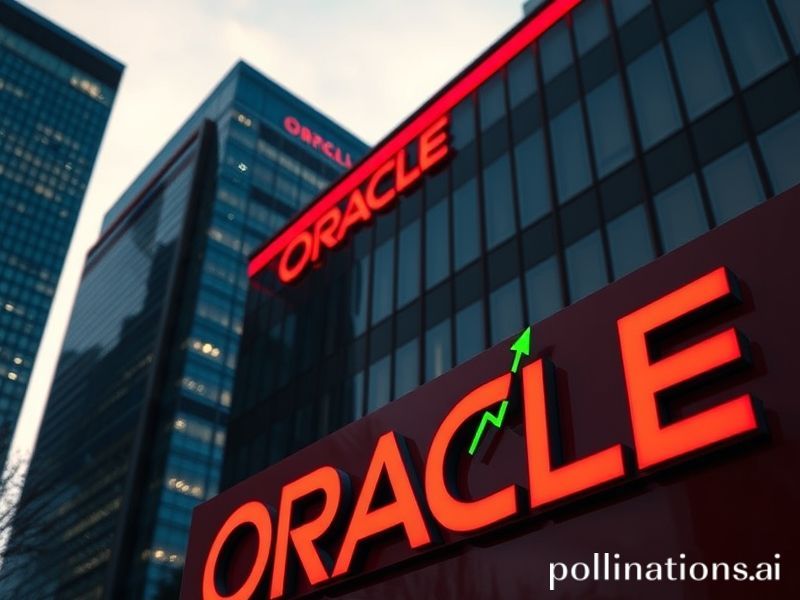Oracle Stock: The Global Database That Outlives Governments (and Your Sanity)
Oracle Stock: When the Cloud Touches Every Passport on Earth
By Dave’s Locker’s resident globe-trotter, still nursing jet-lag from three time-zones and one existential crisis
Redwood Shores, California—home of Oracle Corporation—sits 11,000 kilometers from the nearest Russian troll farm, 9,000 from the closest Nigerian fintech hub, and exactly one Zoom call away from every finance minister currently praying that Larry Ellison’s database empire doesn’t hiccup during their next sovereign-debt auction. On Tuesday, Oracle’s share price added another three percent, because apparently the world’s central banks have decided that inflation, war, and climate collapse are mere side quests; the real final boss is a quarterly earnings beat.
The headline numbers are almost insultingly neat: $15.3 billion in cloud revenue for FY24, up 26 % in constant currency, all conveyed in the soothing baritone of Safra Catz, who could read a ransom note and make it sound like an ESG disclosure. But the international subplot is messier. Oracle now hosts the Czech Republic’s entire tax database, Brazil’s voter rolls, and—because irony is a renewable resource—the Ukrainian Ministry of Defence’s logistics ledger. One misplaced patch note in Redwood and an EU member state can’t collect VAT, a BRICS democracy can’t certify an election, and a country under literal bombardment can’t reroute artillery shells. No pressure, Larry.
Investors from Frankfurt to Jakarta have learned to treat Oracle’s ticker (ORCL) as a geopolitical weather vane. When the Pentagon renews its JEDI-adjacent contract, European pension funds buy; when the Chinese government threatens to “review” Oracle’s mainland operations after another chip-ban tantrum, Latin American family offices sell. It’s globalization in a fun-house mirror: supply chains of ones and zeroes, and every border crossing guarded by a 19-year-old compliance intern with a VPN and a Monster Energy.
The cynical charm of Oracle stock is that it monetizes our collective inability to keep secrets. From the Italian mafia’s preferred invoicing software (true story, Palermo court filings, 2022) to the Saudi sovereign wealth fund’s portfolio optimization, Oracle’s databases quietly inhale humanity’s metadata and exhale predictable cash flows. Analysts call this “recurring revenue”; the rest of us might call it blackmail-as-a-service, but with better margins.
Still, the mood in Tokyo trading rooms is almost jubilant. Japan’s Government Pension Investment Fund just lifted its ORCL allocation, reasoning—if one translates the polite euphemisms correctly—that betting on Oracle is cheaper than rebuilding a domestic cloud from scratch before the next 9.0 quake. Meanwhile, in Lagos, fintech founders curse every Oracle license fee that nibbles at their runway, then use the same Oracle Autonomous Database to scale to Series B. Schrödinger’s capitalism: simultaneously oppressed and empowered, depending on which Slack channel you’re in.
Environmental, social, governance? Oracle’s sustainability report boasts that its European data centers now run on 100 % renewable energy, which is comforting news to the villagers in rural Sweden who can read their electric bill by the light of a server farm. Governance buffs note that Ellison still owns roughly 40 % of the company, making shareholder rebellions about as effective as a strongly worded petition against gravity. Socially, Oracle trains 50,000 students a year in SQL and—who knows—perhaps one of them will eventually patch the glitch that delayed my last wire transfer from Istanbul to Bogotá for four business eternities.
Conclusion: Oracle stock is less a bet on technology than a wager on bureaucratic inertia. As long as ministries, multinationals, and mafias remain allergic to ripping out legacy systems, ORCL will be the cockroach of the cloud age—odious, indestructible, and oddly comforting in its predictability. The world may fracture into trading blocs and TikTok feuds, but somewhere a relational database will still be quietly tallying the damage, billing by the millisecond, and sending the invoice to posterity. And the stock, like the cockroach, will scurry upward, two steps ahead of whatever apocalypse we schedule next quarter.







